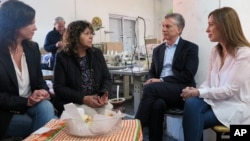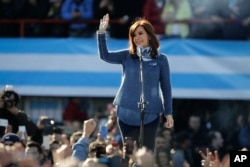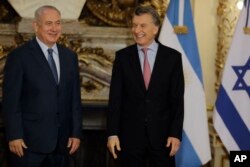Argentine President Mauricio Macri's main defender against a comeback by his populist predecessor Cristina Fernandez in October's legislative elections is someone whose name is not even on the ballot.
Buenos Aires Governor Maria Eugenia Vidal has been handed the role of ensuring Macri’s “Let's Change” coalition wins more votes than Fernandez, who is running for a Senate seat in Argentina's most populous province.
A poll seen exclusively by Reuters and to be published later on Tuesday shows Vidal, 44, is more popular than Macri and holds the key to keeping Fernandez at bay in Buenos Aires. Home to about 40 percent of Argentine voters, the province is the gateway to the presidency.
Billions of dollars in potential investment and the future of Latin America's No. 3 economy hang in the balance.
Investors eyeing Argentina's vast oil and mineral wealth want Maci’s coalition to block any chance of his political nemesis Fernandez returning to the presidency in 2019.
They hope that will turn the page on the free-spending populist governments that have ruled Argentina on-and-off for seven decades since the days of Juan and Evita Peron.
Macri, a scion of a wealthy business family, has a positive image with 44.2 percent of those polled in Buenos Aires province, with Fernandez trailing at 35.1 percent, according to the Observatorio Electoral survey to be distributed Tuesday afternoon.
Vidal, however, comfortably bests them both with 49.8 percent.
Argentina's electoral list system guarantees that Fernandez will win one of the three Buenos Aires province Senate seats up for grabs on Oct. 22.
Even though Fernandez is loved by millions of poor Argentines for her generous social spending, her critics say her growth-at-all-costs policies stoked inflation and distorted the economy through heavy currency controls during her 2007-2015 administrations.
Investors in Argentina's $550 billion economy are therefore focused on how many votes Fernandez and her list of congressional candidates get versus Macri's coalition.
“This election is about electoral power and Cristina's ability to make a comeback. It is not about legislative power,” said Julio Burdman, head of local polling firm Observatorio Electoral, referring to the mid-term vote.
“Vidal is like Captain America. She was created as a super-soldier for Macri to win his war against Cristina," he added.
Vidal, a former welfare administrator known for her common touch with working families, has become a political juggernaut just when Macri needs her to deflect fallout out from his unpopular subsidy cuts and other fiscal tightening measures.
Macri’s man ahead
Some 38.2 percent of respondents in the Observatorio Electoral poll said they plan to vote for the list headed by Macri ally Esteban Bullrich, a little-known former education minister. After making a series of gaffes early in the campaign, he has been accompanied by Vidal at most rallies.
Fernandez's list trailed with 35.8 percent in the opinion poll. The difference was within the survey's 3.2 point margin of error. So with 7.1 percent of voters still undecided as of Friday, it is still anybody's race.
Vidal is meanwhile walking the province, ringing doorbells and taking to the airwaves as a bulwark against Fernandez.
In what has become a typical event aimed at weakening Fernandez among her core supporters, Vidal and Macri visited the suburb of Berazategui on Monday to meet with textile workers.
A poll over the weekend by consultancy Elypsis showed Vidal was Argentina's most popular politician. She is especially strong in the poor, heavily populated Buenos Aires suburbs, a traditional base of Fernandez support where Macri remains relatively unpopular.
Markets recoiled
Argentina's peso currency, bonds and stock market, fearing a return of the profit-killing economic distortions of the Fernandez years, recoiled in June when she announced she would run for the Senate.
Fernandez was indicted for corruption last year. A seat in Congress would give her immunity from arrest, although not from trial. She dismisses the corruption accusations as politically motivated.
It is Vidal's job to make sure Fernandez's support does not grow beyond the 34 percent she got in last month's primary vote, in which she beat Bullrich by less than a percentage point.
Polls have generally shown him gaining since then.
While Fernandez refuses to discuss Vidal, the governor has become the Macri camp's most vocal critic of Fernandez, chiding her for not paying attention to the struggling residents of the province she's running to represent in the Senate.
Vidal's critics say she is a creation of the media, which regularly cover her neighborhood visits and town-hall meetings.
The most direct exchange between Vidal and Fernandez came after the former president alleged that free cafeterias for poor children had been closed as a reprisal measure when school teachers in the province went on strike over better pay.
“I’d like to tell Cristina Fernandez that we know, that we are used to her lying while campaigning,” Vidal said. “But I'd ask her to leave children out of it. They are going to keep eating, strikes or no strikes.”







